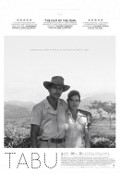
Directed by
Miguel Gomes
118 minutes
Rated MA
Reviewed by
Bernard Hemingway


Tabu
Although Tabu feels like an adaptation of a literary work by a Latin author such as Gabriel Garcia Marquez Miguel Gomes’ film, whose title acknowledges its indebtedness to F. W. Murnau’s 1931 silent film Tabu: A Story of the South Seas, was co-written by him with Mariana Ricardo. Divided into two stylistically different halves that are preceded by a short prologue, whilst the narrative is clear enough, it is the mood of haunting melancholy that carries the film more so than the story itself with the black-and-white cinematography by Rui Poças doing much to give it its suspended, dream-like mood.
The film opens in a slightly surreal fashion with a voiced-overed account of a “poor and sad” Portuguese explorer doggedly trekking his way through the wilds of Africa mourning his dead wife and eventually throwing himself into a crocodile-infested river. The film then switches its point of view to reveal that what we have seen is a film watched by Pilar (Teresa Madruga), a middle-aged single woman living in modern Lisbon.
And so begins Part One of the film, “Paradise Lost” which tells the story of Pilar and her aged neighbour, Aurora (Laura Soveral). who has a vexed relationship with her black housemaid and carer, Santa (Isabel Cardoso) who she periodically accuses of being a practitioner of witchcraft. Eventually Aurora dies and in trying to find her family Pilar meets Ventura (Henrique Espírito Santo) who tells her the story of Aurora’s life in Africa and his adulterous relationship with her. This constitutes “Paradise“, the second part of the film which is shot on 16mm film stock, has no dialogue at all only ambient sounds, is entirely narrated by Ventura and follows an anecdotal path as Ventura describes his affair with Aurora, making occasional detours to recount his role in a covers band, something which allows Gomes to give multiple airings to the Ronettes’ ‘Be My Baby’.
On release the film was widely criticized for circumventing Portugal’s colonial past which apparently was particularly cruel. Certainly nothing of this seen here but this is evidently an artistic choice rather than an oversight. In the broadest sense Tabu is about Aurora's life - from young woman in love to lonely old age. That she is also a privileged member of a white elite who unquestioningly takes for granted the assumptions of her class, one that was doomed to perish in her lifetime, seems clear enough even if this is not presented as a politically-correct tract.
Want something different?





